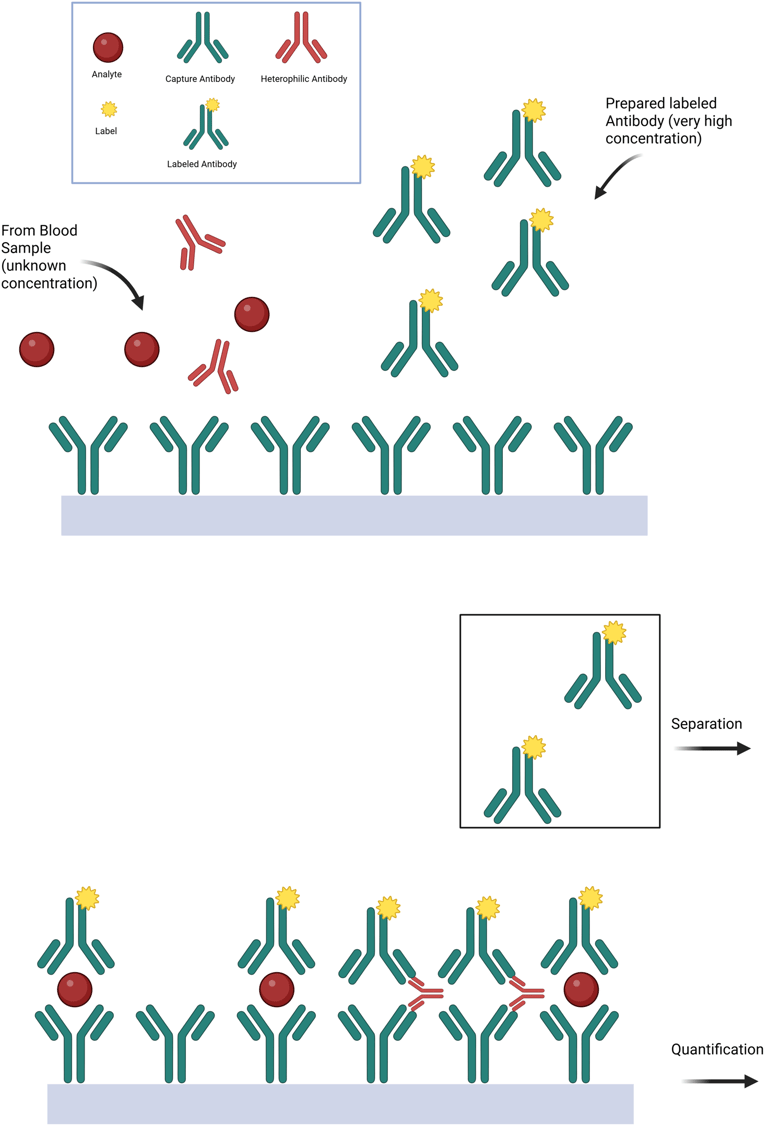Heterophile Antibody Interference
This phenomenon occurs when endogenous antibodies, typically with broad and nonspecific affinity for various antigens, including animal-derived immunoglobulins, disrupt immunoassay function. Due to their bivalent nature, these antibodies can inadvertently bridge the capture and detection antibodies in immunometric assays even in the absence of the target analyte, producing falsely elevated results.
Most individuals have only low titers of heterophile antibodies, and modern immunoassays include blocking agents to neutralize their effect. However, in certain individuals with high titers, such as patients exposed to therapeutic monoclonal antibodies or animal-derived immunoglobulins, these blockers may be insufficient, leading to spurious assay results. In some cases, the source of interference is identifiable; in others, it remains clinically unpredictable.
Use of Single-Chain Antibodies (scFv): Employing single-chain antibodies can reduce heterophilic antibody interference, which can contribute to the hook effect. Single-chain antibodies have a smaller size and reduced likelihood of cross-linking, thereby improving assay reliability.


Illustration: Heterophile Antibody Interference
References
All Illustrations are Created in https://BioRender.com
Haddad, R.A., Giacherio, D. & Barkan, A.L. Interpretation of common endocrine laboratory tests: technical pitfalls, their mechanisms and practical considerations. Clin Diabetes Endocrinol 5, 12 (2019). https://doi.org/10.1186/s40842-019-0086-7
Levinson SS, Miller JJ. Towards a better understanding of heterophile (and the like) antibody interference with modern immunoassays. Clin Chim Acta. 2002 Nov;325(1-2):1-15. doi: 10.1016/s0009-8981(02)00275-9. PMID: 12367762.
Bolstad N, Warren DJ, Bjerner J, Kravdal G, Schwettmann L, Olsen KH, Rustad P, Nustad K. Heterophilic antibody interference in commercial immunoassays; a screening study using paired native and pre-blocked sera. Clin Chem Lab Med. 2011 Sep 8;49(12):2001-6. doi: 10.1515/CCLM.2011.702. Erratum in: Clin Chem Lab Med. 2012 Feb;50(2):409. PMID: 21899496.
Cheng X, Guo X, Chai X, Hu Y, Lian X, Zhang G. Heterophilic antibody interference with TSH measurement on different immunoassay platforms. Clin Chim Acta. 2021 Jan;512:63-65. doi: 10.1016/j.cca.2020.11.018. Epub 2020 Dec 5. PMID: 33285118.
Wheeler, Michael J. Hormone Assays in Biological Fluids. Edited by Michael J. Wheeler, 2nd ed. 2013., vol. 1065, Humana Press, 2013, https://doi.org/10.1007/978-1-62703-616-0.
© 2025 EndoCases. All rights reserved.
This platform is intended for medical professionals, particularly endocrinology residents, and is provided for educational purposes only. It supports learning and clinical reasoning but is not a substitute for professional medical advice or patient care. The information is general in nature and should be applied with appropriate clinical judgment and in accordance with local guidelines.
Portions of the text on this website were edited with the assistance of Artificial Intelligence to improve grammar and phrasing, as English is not my first language. All medical content, ideas for illustrations, and overall structure are original and based on the author’s own expertise and the cited medical literature. No AI tools were used to generate or influence the educational content itself.
All of the content is independent of my employer.
Use of this site implies acceptance of our Terms of Use
Contact us via E-Mail: contact@endo-cases.com